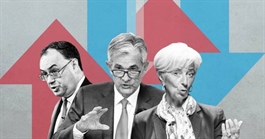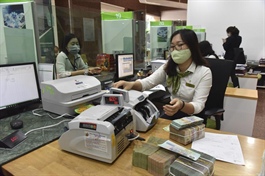Lenders contend with interest rates
Lenders contend with interest rates
Maintaining steady interest rates is set to be a challenge for Vietnam’s central bank amid unfavourable global events and domestic pressures.

The State Bank of Vietnam’s (SBV) data last month showed that by August 26, credit in the economy rose by 9.9 per cent compared to the beginning of the year, although the growth in capital mobilisation reached its lowest level in recent years, at 3.8 per cent.
Nguyen Thanh Tung, deputy general manager of Vietcombank’s Executive Board, said, “The market is appealing in regards to capital mobilisation, causing numerous financial institutions to raise deposit rates to very high levels. The interest rate distinction can sometimes reach 1 per cent based on the terms.”
There is pressure on interest rates in a market where financial institutions, corporates, and residential transactions are steadily expanding. The stated capital mobilisation interest rate level rose from 0.3 to 0.9 per cent at multiple commercial banks, with an adjustment range of 20-40 basis points. The 12-month stated deposit interest rate for institutional clients has risen by 40 to 140 basis points compared to the end of 2021 and may go much higher.
The SBV has increased credit lines for a number of commercial banks with a distributed range of 0.7 to 4 per cent, and credit growth of the whole system is anticipated to expand by around 2 per cent.
Economist Le Xuan Nghia said that with the amended credit room ratio, the total credit balance is expected to be about 13.6 per cent, within the annual cap of 14 per cent for 2022. “Market interest rates have increased quickly due to high capital demand. Commercial banks also have a large number of incomplete credit contracts,” Nghia said. “However, the SBV has been extremely cautious regarding the money supply and credit space to avoid inflation.”
According to VNDS Research, 15 commercial banks have been permitted to increase their foreign ownership limits in recent years, representing almost 80 per cent of the industry’s existing loans. With a credit growth rate of 1-4 per cent, it is predicted that $11.8 billion was spent by the end of August.
The SBV has consistently used flexible open market operations to control market liquidity. In August, the bank issued around $68 billion, allowing almost $4 billion in treasury bills to expire. About $1.5 billion was auctioned in the same month, in conjunction with over $3.1 billion through a sell-buy contract.
It is projected that the SBV sold well over $3 billion in August, indirectly draining this sum from the system. Consequently, it has net withdrawn over $3.2 billion through bills and sales, contracts-purchase, and selling USD.
In August, the interbank rate varied owing to unstable banking system liquidity caused by the SBV’s actions. Liquidity continues to be under significant strain, largely stemming from the expiry of agreements to sell USD, which led to the withdrawal of cash from the system and a rise in the interbank interest rate. In the same month, interbank interest rates sometimes surpassed 7.5 per cent, the highest level since 2012.
Accordingly, the SBV supported the market with front purchasing, with an overall amount of more than $2.7 billion and the flexibility to extend the trading period to 14 days. Likewise, the bank continued to employ interest rate bidding, and open-market interest rates ranged between 4.5 per cent for a 7-day term to 4.65 per cent for a 14-day term, which helped to reduce interbank rates.
A leader of BIDV told VIR, “Pressures are increasing from the global environment, especially the upward trend of the domestic exchange rate. The SBV’s policy has also moved toward tightening,” he said.
He said that VND liquidity was still relatively weak and had deteriorated towards the end of August as cash flow continued to be lured to the SBV through selling treasury notes and foreign currency. In particular, the capital mobilisation-credit balance continues to be under pressure from a significant contraction of capital mobilisation growth that is encountering several obstacles.
“The SBV will likely continue to maintain a restrictive monetary policy despite global pressure, and the currency rate has not tended to ease. This is also an element that will continue to pressure the VND interest rate to annually rise by 0.2 to 0.3 per cent,” the BIDV leader said.
























